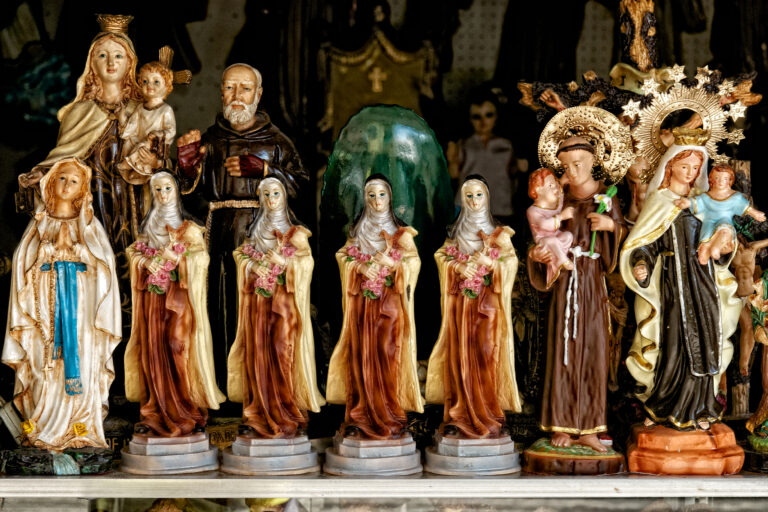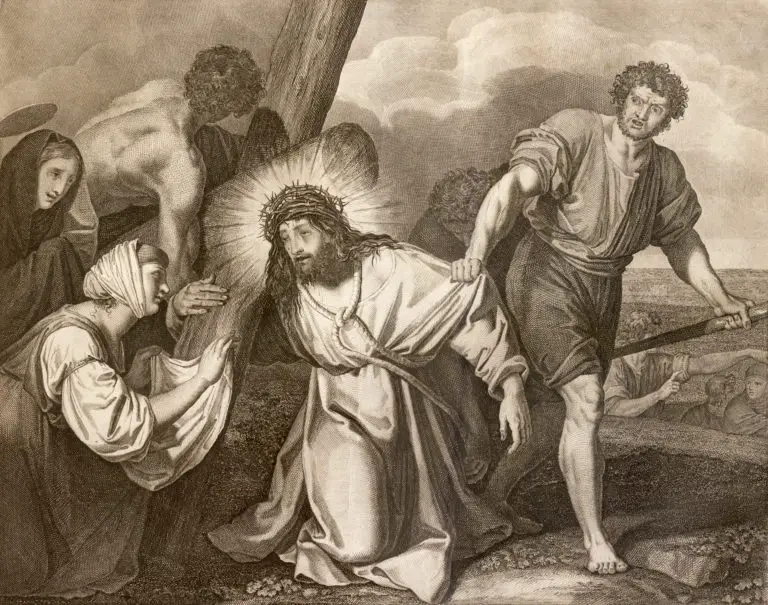The Shocking Truth About Human Souls: Are Most People Really Saved?
The reality of Hell stands as one of the most challenging aspects of Catholic teaching. The Church’s understanding of eternal damnation goes beyond tradition and stays deeply rooted in Biblical truth and Christ’s own words.

What does the Bible say about Hell?
The Bible shows Hell as a place of eternal separation from God. The sort of thing I love about Scripture is how it portrays Hell through various powerful images:
- A place of unquenchable fire (Mark 9:43)
- Eternal punishment (Matthew 25:46)
- Outer darkness (Matthew 8:12)
- Complete separation from God’s presence (2 Thessalonians 1:9)
These descriptions mean more than just metaphors. The truth they point to is nowhere near as simple as the images suggest. A careful study of Biblical texts shows Hell as a conscious state of eternal suffering.
What did Jesus teach about Hell?
Jesus spoke more about Hell than any other Biblical figure. His teachings on eternal damnation left no room for compromise. He addressed this topic with both love and urgency.
Jesus’s key teachings about Hell include:
- It’s a place of eternal separation from God
- The path leading there is wide and many follow it
- It was originally prepared for the devil and his angels
- Those who reject God’s mercy choose it freely
His words consistently highlight personal responsibility.
“Thy damnation comes from thee” – this profound truth echoes throughout His teachings.
God’s Law lives in our hearts. Our conscience guides even those who never heard of Christ to know right from wrong. This natural law guides humanity toward salvation.
The path to salvation remains narrow and demanding.
Saint Ambrose says that you’ll find more people who kept their innocence than those who did proper penance. This sobering reality makes us think deeply about souls’ state.
The sacrament of penance offers powerful salvation but faces many challenges. Many confessions get distorted by excuses, false promises, and ineffective resolutions. Some people confess to avoid excommunication, others to keep up appearances, while many lack true contrition.
God wants all souls saved. He gives abundant graces and opportunities to convert. Saint Augustine explains that people turn from righteousness by their own free will, led by their desires.
God’s mercy reaches to Hell’s gates. He chases the sinner with inspirations, holy thoughts, and countless chances to convert. His patience stays strong even with stubborn evil. This divine persistence in seeking our salvation shows His love’s depth.
Many souls still choose damnation despite these abundant graces.
Human stubbornness, not God’s lack of mercy, leads to this choice. Hell’s reality stands as proof of human free will’s dignity rather than divine cruelty.
Is the majority of humanity saved from Hell?
The question about salvation leads me to a sobering reality. The most respected theologians and Church Fathers tell us that eternal damnation awaits the majority of humanity.
My research of authoritative sources reveals:
- Cardinal Cajetan and Cardinal Bellarmine teach that most Christian adults face damnation
- Suarez’s extensive research confirms this as the most common theological position
- Saint Ambrose points out that finding those with innocence is easier than those who truly repent
- Saint Chrysostom expressed doubt about many priests’ salvation with tears in his eyes
This goes beyond mere numbers. We need to understand why souls choose damnation.
Many Catholics approach the sacrament of penance without the right mindset. These common mistakes stand out:
- They confess without true contrition
- They make false promises to change
- They hide sins out of shame
- They seek absolution just to avoid excommunication
- They lack real commitment to change
Does God desire our Salvation?
God wants everyone’s salvation. He shows this through countless opportunities to convert. Even those who never knew the Catholic faith receive enough help to find salvation.
The natural law exists in every human heart. People born far from Christian civilization can tell right from wrong. This moral compass works as God’s first call to salvation.
God pursues souls until their final breath. He sends good thoughts, holy inspirations, and yes, even illness serves as a wake-up call. His patience goes way beyond our understanding. He heals the sick, forgives again and again, and gives countless chances to convert.
People who end up in hell choose their fate.
He gives abundant grace and sometimes performs miracles to prevent damnation. Still, He respects our free will and lets us make the final choice.
Hell’s residents get exactly what they chose in life – separation from God.
The tragedy lies not in God’s mercy but in people’s constant rejection of divine love.
Today’s society shows patterns that worried the Church Fathers. The casual use of sacraments, the light approach to sin, and lukewarm faith suggest things haven’t gotten better.
Saint Leonard of Port Maurice’s teachings appeal to us today. His words carry weight because the Church’s experience over centuries verifies them. The Divine Office acknowledges his preaching’s power to confront this difficult truth.
The evidence shows that while salvation remains open to all, few take the narrow path.
This happens not because God limits His mercy, but because many prefer the wider, easier road to destruction.
What do exorcists reveal about the souls in Hell?
My deep research into exorcism records has revealed shocking truths about souls in hell. These accounts from real exorcisms are a great way to get knowledge about the eternal fate of damned souls.
A notable exorcism in 1978 revealed remarkable testimony from a damned priest who spoke through a possessed person. His message left us haunted yet enlightened.
“We the princes of darkness thank you,” he told religious leaders, acknowledging how their negligence led countless faithful to damnation.
The conversations with souls in the abyss struck me deeply. Their response about Catholics in hell was chilling: “There certainly are!”
These souls said they were “too far down” to be brought up, as it would “turn all of hell upside down.”
The exorcism accounts revealed several key points:
- Souls in hell chose their own damnation
- Many got abundant graces but rejected them
- People without faith had enough help to achieve salvation
- The natural law guided everyone’s conscience
- God would have performed miracles to save those willing
God’s justice stays perfectly balanced with His mercy, despite these harsh revelations.
A damned soul testified: “O Lord, Thou art just… and Thy judgments are equitable.”
The natural law, written in every heart, gave moral guidance. An exorcist explained that even “barbarians hid when they committed sin, because they knew they were doing wrong.”
These testimonies highlight personal responsibility. Jesus pursued souls until the gates of hell, sending inspirations, holy thoughts, and even healing mortal illnesses to prevent damnation.
Negligence rather than malice condemned many good people. Many souls received extraordinary graces but failed to use them. Some got more help than others who were saved, yet wasted these gifts through pride or indifference.
These souls now have perfect knowledge of the graces they rejected.
One testimony states: “We do not know what they were, but they know them well.”
This awareness torments them eternally.
What does St Leonard of Port Maurice teach about the Fewness of those who are saved?
My deep study of St. Leonard of Port Maurice’s teachings led me to find a profound and sobering message about eternal salvation. St. Leonard moved even the hardest hearts to penance with his heavenly eloquence. He presents compelling evidence about the small number of saved souls.
St. Leonard’s teachings are built on three pillars: faith, authority, and reason. My research shows he consulted many theologians, including two learned cardinals – Cajetan and Bellarmine. These eminent scholars came to an unquestionable conclusion – among Christian adults, saved souls remain a minority.
The most striking aspects of St. Leonard’s teachings stand out:
- The path to salvation requires extraordinary effort
- Many Christians approach penance without proper disposition
- God’s abundant graces go to waste
- Natural law serves as humanity’s first guide
- Divine mercy extends until the final moment
In one of his preaching, St Leonard recalls the following from Saint Vincent Ferrer:
“… He relates that an archdeacon in Lyons gave up his charge and retreated into a desert place to do penance, and that he died the same day and hour as Saint Bernard.
After his death, he appeared to his bishop and said to him,
“Know, Monsignor, that at the very hour I passed away, thirty-three thousand people also died. Out of this number, Bernard and myself went up to heaven without delay, three went to purgatory, and all the others fell into Hell.”
A very chilling testimony but this may very well be the reality.
These teachings might seem harsh at first glance. Yet I’ve come to understand that St. Leonard’s message flows from profound compassion. He begs sinners on his knees, “by the blood of Christ and by the Heart of Mary,” to change their lives and join the small number of saved souls.
In another reference from St Leonard’s sermon on the “fewness of those who are saved” he recounts that …
“One day Saint John Chrysostom, preaching in the cathedral in Constantinople and considering these proportions, could not help but shudder in horror and ask,
“Out of this great number of people, how many do you think will be saved?”
And, not waiting for an answer, he added,
“Among so many thousands of people, we would not find a hundred who are saved, and I even doubt for the one hundred.”
What a dreadful thing!
The great Saint believed that out of so many people, barely one hundred would be saved; and even then, he was not sure of that number.
What will happen to you who are listening to me? Great God, I cannot think of it without shuddering! Brothers, the problem of salvation is a very difficult thing; for according to the maxims of the theologians, when an end demands great efforts, few only attain it.”
St. Leonard emphasizes personal responsibility alongside this urgent plea. He teaches that damnation always comes from oneself, never from God. This brings to mind countless souls crying out in hell, acknowledging they chose their fate.
St. Leonard lays out a clear path to understanding salvation:
- Recognize the reality of eternal consequences
- Acknowledge personal responsibility
- Welcome true contrition
- Make sincere confession
- Maintain firm purpose of amendment
- Practice ongoing penance
- Persevere until death
St. Leonard’s teachings line up perfectly with Scripture. Each soul must face judgment eventually. Many people approach this reality with dangerous complacency. We often forget that salvation requires constant watchfulness.
The most challenging part of St. Leonard’s message focuses on the abuse of sacraments.
The Church’s centuries of experience verify St. Leonard’s teachings on salvation. The Divine Office acknowledges his “astonishing effectiveness” in moving souls to penance.
His words pierce hearts today and call us to serious reflection on eternal destiny.
St. Leonard doesn’t just present a frightening message – he offers hope through practical guidance. His instruction helps modern Catholics face contemporary challenges to faith.
St. Leonard’s doctrine saved countless souls throughout history. His message strikes a chord with particular urgency today as casual attitudes toward sin and salvation increase. His teachings remind us that eternal life demands serious effort and constant watchfulness.
Summaries
These sobering truths about salvation have touched me deeply as I understand their eternal risks. Scripture, Church Fathers, exorcism accounts, and St. Leonard’s teachings point to a clear truth – God gives abundant grace to save souls, yet many people choose damnation through their own free will.
This truth just needs careful thought. My research shows that salvation goes beyond casual religious observance. It calls for genuine contrition, proper use of sacraments, and unwavering perseverance. God pursues each soul with extraordinary patience and mercy, but we make the final choice.
These teachings emphasize our personal role in salvation by a lot. Every soul gets enough grace, yet many waste these heavenly gifts through carelessness or stubbornness. Nature’s law lives in human hearts and guides humanity first, so nobody can excuse themselves for rejecting God’s mercy.
This knowledge should drive us to act rather than despair. God’s constant love brings hope – His mercy reaches even those near hell’s gates who truly repent. Salvation stays within reach for those who choose it through proper confession, sincere contrition, and strong commitment to change.





